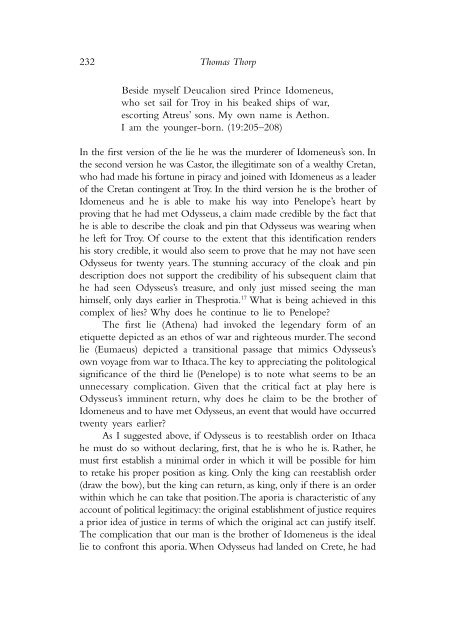You also want an ePaper? Increase the reach of your titles
YUMPU automatically turns print PDFs into web optimized ePapers that Google loves.
232 Thomas Thorp<br />
Beside myself Deucalion sired Prince Idomeneus,<br />
who set sail for Troy in his beaked ships <strong>of</strong> war,<br />
escorting Atreus’ sons. My own name is Aethon.<br />
I am <strong>the</strong> younger-born. (19:205–208)<br />
In <strong>the</strong> first version <strong>of</strong> <strong>the</strong> lie he was <strong>the</strong> murderer <strong>of</strong> Idomeneus’s son. In<br />
<strong>the</strong> second version he was Castor, <strong>the</strong> illegitimate son <strong>of</strong> a wealthy Cretan,<br />
who had made his fortune in piracy and joined with Idomeneus as a leader<br />
<strong>of</strong> <strong>the</strong> Cretan contingent at Troy. In <strong>the</strong> third version he is <strong>the</strong> bro<strong>the</strong>r <strong>of</strong><br />
Idomeneus and he is able to make his way into Penelope’s heart by<br />
proving that he had met Odysseus, a claim made credible by <strong>the</strong> fact that<br />
he is able to describe <strong>the</strong> cloak and pin that Odysseus was wearing when<br />
he left for Troy. Of course to <strong>the</strong> extent that this identification renders<br />
his story credible, it would also seem to prove that he may not have seen<br />
Odysseus for twenty years. The stunning accuracy <strong>of</strong> <strong>the</strong> cloak and pin<br />
description does not support <strong>the</strong> credibility <strong>of</strong> his subsequent claim that<br />
he had seen Odysseus’s treasure, and only just missed seeing <strong>the</strong> man<br />
himself, only days earlier in Thesprotia. 17 What is being achieved in this<br />
complex <strong>of</strong> lies? Why does he continue to lie to Penelope?<br />
The first lie (A<strong>the</strong>na) had invoked <strong>the</strong> legendary form <strong>of</strong> an<br />
etiquette depicted as an ethos <strong>of</strong> war and righteous murder. The second<br />
lie (Eumaeus) depicted a transitional passage that mimics Odysseus’s<br />
own voyage from war to Ithaca. The key to appreciating <strong>the</strong> politological<br />
significance <strong>of</strong> <strong>the</strong> third lie (Penelope) is to note what seems to be an<br />
unnecessary complication. Given that <strong>the</strong> critical fact at play here is<br />
Odysseus’s imminent return, why does he claim to be <strong>the</strong> bro<strong>the</strong>r <strong>of</strong><br />
Idomeneus and to have met Odysseus, an event that would have occurred<br />
twenty years earlier?<br />
As I suggested above, if Odysseus is to reestablish order on Ithaca<br />
he must do so without declaring, first, that he is who he is. Ra<strong>the</strong>r, he<br />
must first establish a minimal order in which it will be possible for him<br />
to retake his proper position as king. Only <strong>the</strong> king can reestablish order<br />
(draw <strong>the</strong> bow), but <strong>the</strong> king can return, as king, only if <strong>the</strong>re is an order<br />
within which he can take that position. The aporia is characteristic <strong>of</strong> any<br />
account <strong>of</strong> political legitimacy: <strong>the</strong> original establishment <strong>of</strong> justice requires<br />
a prior idea <strong>of</strong> justice in terms <strong>of</strong> which <strong>the</strong> original act can justify itself.<br />
The complication that our man is <strong>the</strong> bro<strong>the</strong>r <strong>of</strong> Idomeneus is <strong>the</strong> ideal<br />
lie to confront this aporia. When Odysseus had landed on Crete, he had
















